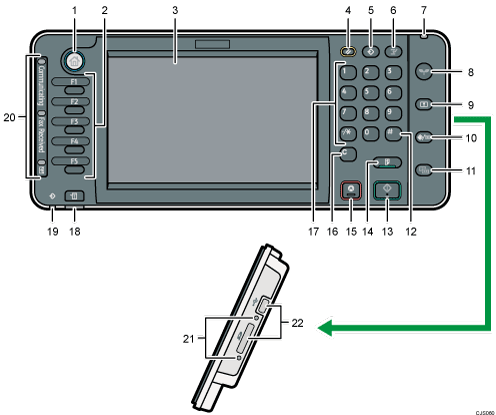This illustration shows the control panel of the machine with options fully installed.

[Home] key
Press to display the [Home] screen. For details, see How to Use the [Home] Screen
 .
.Function keys
No functions are registered to the function keys as a factory default. You can register often used functions, programs, and Web pages. For details, see Configuring function keys
 .
.Display panel
Displays keys for each function, operation status, or messages. See How to Use the Screens on the Control Panel
 .
.[Reset] key
Press to clear the current settings.
[Program] key (copier, Document Server, facsimile, and scanner mode)
Press to register frequently used settings, or to recall registered settings.
See "Registering Frequently Used Functions", Convenient Functions.
Press to program defaults for the initial display when modes are cleared or reset, or immediately after the main power switch is turned on.
See "Changing the Default Functions of the Initial Screen", Convenient Functions.
[Interrupt] key
Press to make interrupt copies. See "Interrupt Copy", Copy/ Document Server.
Main power indicator
The main power indicator goes on when you turn on the main power switch.
[Energy Saver] key
Press to switch to and from Low Power mode or Sleep mode. See Saving Energy
 .
.When the machine is in Low Power mode, the [Energy Saver] key is lit. In Sleep mode, the [Energy Saver] key flashes slowly.
[Login/Logout] key
Press to log in or log out.
[User Tools/Counter] key
User Tools
Press to change the default settings to meet your requirements. See "Accessing User Tools", Connecting the Machine/ System Settings.
Counter
Press to check or print the counter value. See "Counter", Maintenance and Specifications.
You can find out where to order expendable supplies and where to call when a malfunction occurs. You can also print these details. See "Checking Enquiry Using the User Tools", Maintenance and Specifications.
[Simple Screen] key
Press to switch to the simple screen. See Switching Screen Patterns
 .
.[
 ] key (Enter key)
] key (Enter key)Press to confirm values entered or items specified.
[Start] key
Press to start copying, printing, scanning, or sending.
[Sample Copy] key
Press to make a single set of copies or prints to check print quality before making multiple sets. See "Sample Copy", Copy/ Document Server.
[Stop] key
Press to stop a job in progress, such as copying, scanning, faxing, or printing.
[Clear] key
Press to delete a number entered.
Number keys
Use to enter the numbers for copies, fax numbers and data for the selected function.
[Check Status] key
Press to check the machine's system status, operational status of each function, and current jobs. You can also display the job history and the machine's maintenance information.
Data In indicator (facsimile and printer mode)
Flashes when the machine is receiving print jobs or LAN-Fax documents from a computer. See Fax and Print.
Communicating indicator, Fax Received indicator, Confidential File indicator
Communicating indicator
Lights continuously during data transmission and reception.
Fax Received indicator
Lights continuously while data other than personal box or Memory Lock file is being received and stored in the fax memory.
See "Substitute Reception", Fax.
Confidential File indicator
Lights continuously while personal box data is being received.
Blinks while Memory Lock file is being received.
See "Personal Boxes" and "Printing a File Received with Memory Lock", Fax.
Media access lamp
Lights up when a removable memory device is inserted in the media slot.
Media slots
Use to insert an SD card or a USB flash memory.
